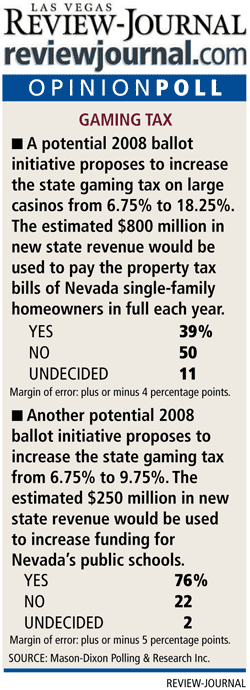Gaming tax hike backed
CARSON CITY -- By more than a 3-1 margin, likely Nevada voters support the Nevada State Education Association's proposal to increase the gaming tax by 3 percentage points and spend the proceeds on public school education, according to a poll commissioned by the Review-Journal.
But the poll also found only 39 percent of respondents favor another proposed gaming tax petition that might be circulated by Las Vegas lawyer Kermitt Waters.
His petition would increase the tax, now 6.75 percent, to 18.25 percent, which is about the average in states with gaming.
Fifty percent of people surveyed oppose that nearly 300 percent tax increase, while 11 percent are undecided.
Unlike Waters' proposal, the education association petition would increase the tax by about 50 percent, to a rate of 9.75 percent.
Seventy-six percent of those polled back the teachers' proposal; 22 percent oppose it and 2 percent are undecided.
"The poll shows people support taxing the big, evil casinos to help little kids in schools," quipped pollster Brad Coker with Washington, D.C.-based Mason-Dixon Polling & Research, Inc.
But Coker added the gaming industry has the funds to mount an effective campaign against the NSEA petition.
Coker said the results could be far different a year from now.
Coker also said that Waters' petition is "dead on arrival."
"People want to increase the gaming tax, but they don't want to put the casinos out of business," Coker said.
A total of 625 registered voters in Nevada were surveyed by telephone Tuesday through Thursday for Waters' petition. The results have a margin of error of plus or minus 4 percentage points.
Pollsters did not begin surveying for the NSEA petition until Wednesday. In all, 406 people were polled. Those results have a margin of error of plus or minus 5 percentage points.
Lynn Warne, NSEA president, was ecstatic about the support for her group's petition.
"This is outstanding," Warne said. "We certainly have the support of the public. They want something done, and they are looking to gaming to help us do it."
She said the teachers association has waited in vain for years for the Legislature to appropriate more money for education. Teachers still receive only 2 percent to 4 percent annual salary increases and Nevada ranks 49th in per capita funding of public education, according to Warne.
Nevada Resort Association President Bill Bible does not consider the results "anti-gaming," but a reflection of the desire of citizens to improve public education.
"There always is overwhelming support for increasing support for education," Bible said. "We as employers want an educated work force and, as parents, want our children to get the best education possible."
But he noted pollsters did not tell respondents that the tax increase was almost 50 percent or ask whether they would support other types of tax increases to raise money for schools.
Citizens will support increasing taxes for schools as long as they are the type of taxes they do not directly pay themselves, according to Bible.
The gaming industry has been conducting an ad campaign to show it already pays about one-third of the revenue going to the public schools.
Bible was not surprised by the opposition to Waters' proposal to nearly triple the gaming tax.
"People see that number and can figure out in their heads quickly what it does," Bible said. "They are saying 'Wait a minute, that is just too much.' "
Waters, however, was surprised the poll found more opposition than support for his petition.
"I can't find anybody who is against it," he said.
Mason-Dixon poll takers told respondents the 18.25 percent tax would produce about $800 million a year and that revenue would be used to pay property taxes for all single-family homeowners each year.
Waters said his estimates are the tax would bring in $2 billion a year. He also wants revenue used to give teachers a $10,000 salary increase and to spend about $900 million a year to improve highways. Money also would be spent to cover Millennium Scholarship costs and improve the court system.
If people polled had been told that, and apprised of the fact that the 18.25 percent is the national average, then Waters said the results would have been far different.
The state Gaming Control Board issued a report earlier this year that showed combined net profits for all casinos in Nevada in 2006 were $2.1 billion, nearly the amount of money Waters wants to extract from the industry.
Waters acknowledged he still is drawing up his petition and it will not be submitted for another two to three weeks.
Before circulating the petition, Waters will conduct his own poll. If he finds people do not want the higher gaming taxes, then he said he will end his efforts. He estimated it would cost him $250,000 to $400,000 to fund a signature-gathering campaign.
"If I think people don't want it, I won't do it," Waters said.
The NSEA will begin circulating its petitions in another month.
The association needs to gather 58,628 valid signatures on petitions by May 20.
Then the proposal would be placed before voters in the November 2008 election. If approved by voters then and again in 2010, the higher tax would be put into effect in 2011.
Although the NSEA initially estimated the 3 percentage point tax increase would bring in $250 million a year, the actual increase, according to state revenue reports, would be more than $400 million a year.
The higher tax rate would apply to casinos with gaming revenues of more than $1 million per month.
Under the provisions of the petition, 40 percent of the funds raised would be spent on salary increases, 40 percent would go to reduce class sizes and expand the length of the school year, and 20 percent would go toward teacher incentive pay and to compensate them for out-of-pocket expenses.
Contact Capital Bureau Chief Ed Vogel at evogel@reviewjournal.com or (775) 687-3901.
ON THE WEB Complete poll information

















